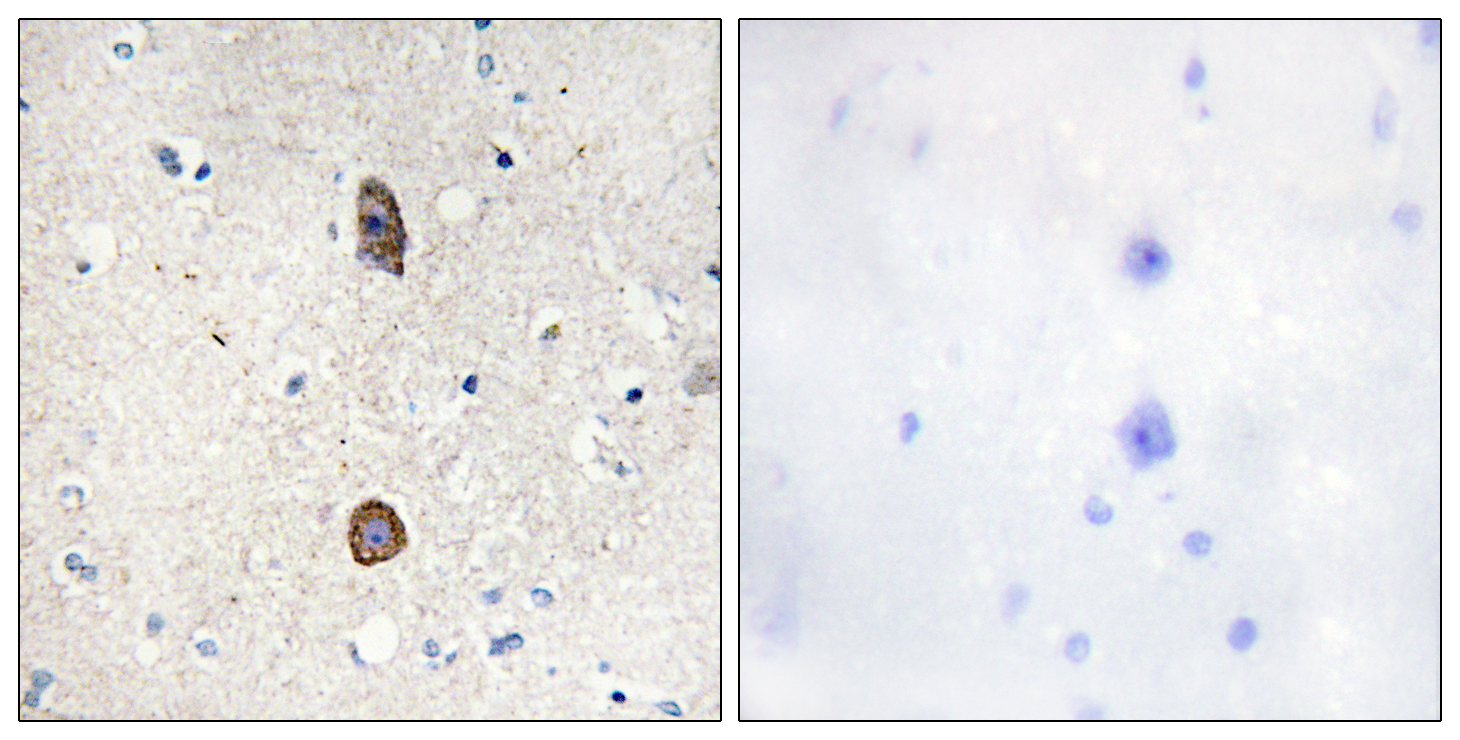IGFBP3 (phospho Ser183) Polyclonal Antibody
- Catalog No.:YP1001
- Applications:WB;IHC;IF;ELISA
- Reactivity:Human;Mouse
- Target:
- IGFBP3
- Fields:
- >>p53 signaling pathway;>>Cellular senescence;>>Growth hormone synthesis, secretion and action;>>Transcriptional misregulation in cancer
- Gene Name:
- IGFBP3
- Protein Name:
- Insulin-like growth factor-binding protein 3
- Human Gene Id:
- 3486
- Human Swiss Prot No:
- P17936
- Mouse Swiss Prot No:
- P47878
- Immunogen:
- The antiserum was produced against synthesized peptide derived from human IGFBP-3 around the phosphorylation site of Ser183. AA range:151-200
- Specificity:
- Phospho-IGFBP3 (S183) Polyclonal Antibody detects endogenous levels of IGFBP3 protein only when phosphorylated at S183.
- Formulation:
- Liquid in PBS containing 50% glycerol, 0.5% BSA and 0.02% sodium azide.
- Source:
- Polyclonal, Rabbit,IgG
- Dilution:
- WB 1:500 - 1:2000. IHC 1:100 - 1:300. ELISA: 1:5000.. IF 1:50-200
- Purification:
- The antibody was affinity-purified from rabbit antiserum by affinity-chromatography using epitope-specific immunogen.
- Concentration:
- 1 mg/ml
- Storage Stability:
- -15°C to -25°C/1 year(Do not lower than -25°C)
- Other Name:
- IGFBP3;IBP3;Insulin-like growth factor-binding protein 3;IBP-3;IGF-binding protein 3;IGFBP-3
- Observed Band(KD):
- 31kD
- Background:
- This gene is a member of the insulin-like growth factor binding protein (IGFBP) family and encodes a protein with an IGFBP domain and a thyroglobulin type-I domain. The protein forms a ternary complex with insulin-like growth factor acid-labile subunit (IGFALS) and either insulin-like growth factor (IGF) I or II. In this form, it circulates in the plasma, prolonging the half-life of IGFs and altering their interaction with cell surface receptors. Alternate transcriptional splice variants, encoding different isoforms, have been characterized. [provided by RefSeq, Jul 2008],
- Function:
- developmental stage:IGFBP3 levels are higher during extrauterine life and peak during puberty.,domain:The thyroglobulin type-1 domain mediates interaction with HN.,function:IGF-binding proteins prolong the half-life of the IGFs and have been shown to either inhibit or stimulate the growth promoting effects of the IGFs on cell culture. They alter the interaction of IGFs with their cell surface receptors.,induction:IGFBP3 levels increase in the presence of IGF1, insulin and other growth-stimulating factors such as growth hormone, epidermal growth factor, and phorbol esters.,online information:The Singapore human mutation and polymorphism database,similarity:Contains 1 IGFBP N-terminal domain.,similarity:Contains 1 thyroglobulin type-1 domain.,subunit:Interacts with XLKD1 (By similarity). Binds IGF2 more than IGF1. Forms a ternary complex of about 140 to 150 kDa with IGF1 or IGF2 and a 85 k
- Subcellular Location:
- Secreted .
- Expression:
- Expressed by most tissues. Present in plasma.
- June 19-2018
- WESTERN IMMUNOBLOTTING PROTOCOL
- June 19-2018
- IMMUNOHISTOCHEMISTRY-PARAFFIN PROTOCOL
- June 19-2018
- IMMUNOFLUORESCENCE PROTOCOL
- September 08-2020
- FLOW-CYTOMEYRT-PROTOCOL
- May 20-2022
- Cell-Based ELISA│解您多样本WB检测之困扰
- July 13-2018
- CELL-BASED-ELISA-PROTOCOL-FOR-ACETYL-PROTEIN
- July 13-2018
- CELL-BASED-ELISA-PROTOCOL-FOR-PHOSPHO-PROTEIN
- July 13-2018
- Antibody-FAQs
- Products Images

- Enzyme-Linked Immunosorbent Assay (Phospho-ELISA) for Immunogen Phosphopeptide (Phospho-left) and Non-Phosphopeptide (Phospho-right), using IGFBP-3 (Phospho-Ser183) Antibody

- Immunohistochemistry analysis of paraffin-embedded human brain, using IGFBP-3 (Phospho-Ser183) Antibody. The picture on the right is blocked with the phospho peptide.

- Western blot analysis of lysates from Jurkat cells, primary antibody was diluted at 1:1000, 4°over night



